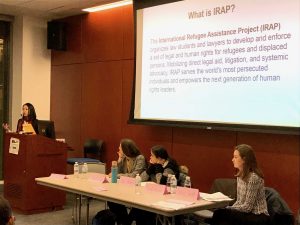By Jasmin Boyce

Students and community members discussed current New York City immigration laws and immigrant rights at an open “Know Your Rights” forum on Monday night, sponsored by Fordham’s Bronx African American History Project.
The forum, held in the Campbell Hall multipurpose room, featured representatives from organizations heavily involved in fighting for immigrant rights, including Bronx Defenders, the International Refugee Assistance Project, the CLEAR Project and the Office of the Mayor’s Center for Faith and Community Partnership.
The event comes at a time of frequent raids conducted by U.S. Immigration and Customs Enforcement (ICE), as the Trump administration has put greater focus on illegal immigration. Describing the fear of deportation or of losing loved ones experienced by illegal immigrants in New York City, Bronx Defenders staff attorney Sarah Borsody explained a major tactic commonly utilized by the government agency.
“High ranking ICE officials have stated themselves that people should be afraid, and sort of selling this kind of climate of fear,” said Borsody. “The fact is that just because you are an immigrant or you weren’t born here doesn’t necessarily mean that you can be arrested by ICE.”
Commonly, ICE seeks out immigrants through targeted surveillance, workplace raids, court house arrests and home raids, according to the panelists. In the event that ICE arrives at a person’s doorstep, CLEAR Project Staff Attorney, Naz Ahmed, provided three “golden rules” to follow.
“One, don’t open the door. Ask for a warrant. Two, repeat some variation of ‘I don’t feel comfortable answering any questions without an attorney present.’ Three, if for whatever reason they manage to get into your home, keep repeating ‘I do not consent to this search’. These are very important for legal reasons,” said Ahmed.
Immigrants also face hardship during international travels, according to representatives from the International Refugee Assistance Project (IRAP). Countries presently affected by the refugee ban and travel ban are Chad, Iran, Syria, Libya, Yemen, Somalia, Venezuela and North Korea.
Close to a year ago, protests erupted at JFK along with other airports throughout the nation surrounding the issues of detaining immigrants who were entering the country. Mariko Hirose, IRAP’s Litigation Director, recounted the project’s experience challenging these bans in the court system.
She said two of IRAP’s clients were detained while coming to the United States on special immigrant visas after working with the US military for years. Hirose said IRAP was active in challenging the ban.
“We got very involved in the challenge to the Muslim ban, and we worked with our advocates to file a lawsuit overnight,” said Hirose. “The day after the executive order came down, we went into court, sued and got the first order that stopped the deportations under the executive order. Since then, we’ve been involved in challenging every version of the Muslim ban.”
The project’s paralegal Casey Smith discussed IRAP’s advice for its clients when travelling internationally and navigating inspections by airport officials. Tips ranged from providing family with your itinerary before travel to knowing your right to water, food, medicine and a translator during secondary inspection. When interacting with U.S. Customs and Border Protection (CBP) officers, Smith urged all parties involved to be respectful.
“During all interactions, CBP officers must treat you with respect and courtesy, and so we recommend that if anyone treats you with disrespect you note their names and file some sort of report after the fact,” said Smith.
Jonathan Soto, executive director from the Center for Faith and Community Partnership, urged the crowd to have a unified approach moving forward.
“We are seeing our activists jailed throughout the country; we are seeing our freedom fighters put at risk of deportation, and you all here are really going to shape the future of activism and engagement,” said Soto.
Mark Naison, Ph.D., professor of History and African American Studies and event sponsor said this event was an important one to host at Fordham.
“All these contacts and numbers are resources which we can spread around,” said Naison. “This is just the beginning of our resistance, at this university in the Bronx, in the city and around the country. I’ve been here and I can smell it.”
The event was formed in collaboration with the Muslim Social Justice Initiative and Bronx Educators Unite for Justice. This forum was not the first hosted by the collaborators, and event organizers said that they hope to host similar events in the future.







































































































































































































